
Cambridge 11 - hướng dẫn làm bài IELTS Writing task 2
Đ thi IELTS Writing task 2 cu n Cambridge 11 Test 2ề ố
Some people claim that not enough of the waste from homes is recycled. They say that the
only way to increase recycling is for governments to make it a legal requirement. To what
extent do you think laws are needed to make people recycle more of their waste?
Phân tích đ bàiề
– Keywords: increase recyling
– Micro-keywords: governments, legal requirement, law
– Action keywords: To what extent do you think… → D ng bài Opinion Essay.ạ
C u trúc bài vi tấ ế
Sau khi k t thúc phân tích đ – m t trong các b cế ề ộ ướ chu n b tr c khi vi t bàiẩ ị ướ ế , chúng ta
chuy n sangể l p dàn ý v i b c c 4 ph n c th d i đây.ậ ớ ố ụ ầ ụ ể ướ
– Introduction:
Gi i thi u topic. Ph n này l u ý gói g n trong 1 câu thôi nhé các b n.ớ ệ ầ ư ọ ạ
Tr l i câu h i.ả ờ ỏ
– Body 1:
Topic sentence: Ra lu t v x lý rác th i t i gia là cách gi i quy t h a h n hi u qu .ậ ề ử ả ạ ả ế ứ ẹ ệ ả
Supporting idea: Khi lu t đ c đ a ra thì ng i dân s chú ý hành vi h n. D n d n t aậ ượ ư ườ ẽ ơ ầ ầ ọ
nên thói quen t t v b o v môi tr ng cho ng i dân.ố ề ả ề ườ ườ
– Body 2:
Topic sentence: M t khác, giáo d c cũng là m t cách hi u qu không kém.ặ ụ ộ ệ ả
Supporting idea 1: Chính ph nên có đ i ngũ giáo viên lành ngh v lĩnh v c này đ ủ ộ ề ề ự ể
truy n đ t cho h c sinh ki n th c phân lo i rác.ề ạ ọ ế ứ ạ
Supporting idea 2: N u ra lu t ph t thì s t ng đ i thi u tính th c ti n khi áp d ng ế ậ ạ ẽ ươ ố ế ự ễ ụ
“cào b ng” cho c nh ng h gia đình thu nh p th p, t o gánh n ng cho h .ằ ả ữ ộ ậ ấ ạ ặ ọ
– Conclusion: K t lu n câu h i theo ý ki n b n thân. L u ý,ế ậ ỏ ế ả ư vi t conclusion ng n và ế ắ
“ch t”ấ th hi n rõ ý trong th i gian ng n thay vì dài dòng, lê thê vàể ệ ờ ắ l i m t th i gian, nh ạ ấ ờ ả
h ng t i th i gian làm các ph n khác b n nhé.ưở ớ ờ ầ ạ
Gi i đ thi IELTS Writing task 2 cu n Cambridge 11 Test 2ả ề ố
Bài m u tham kh oẫ ả
It is difficult to conceive a sustainable economic growth without a clean and healthy living
condition for people. For this reason, many suggest a new legislation on household waste
recycling as the only way to protect the living environment. I partly agree with this statement.
On the one hand, I concur that a law on waste recycling is a promising approach to the
problems of waste from households. It is true that when a bill is adopted and made into a law,
people undoubtedlypay more attention to it and take it with more serious consideration. If they
know that they can be fined, punished or even imprisoned for not obeying recycling laws, they
will certainly abide by the laws and take more responsibility for classifying the waste from their
homes. This will gradually form a good habit of protecting the surrounding environment among
the population. For this reason, more waste from home can be recycled, contributing to a
cleaner environment.
On the other hand, I do not agree that this is the only measure to increase recycling because
education can be equally or even more effective to solve the problem of household waste. For
example, governments should have well-trained teachers impart the knowledge of how
to properly recycle household waste to students. Children who receive this knowledge can
recycle with a higher level of effectiveness and success than those who do not. Another reason
why I do not agree with this new law is that this policy is apparently impractical to low-
income families who are already struggling with many problems in their life. A law on treating
waste from their homes just places a heavier burden and greater anxiety on them.
In conclusion, the introduction of a new law on treating waste from homes can be an effective
measure to some extent, but this would certainly not be the only way and not a feasible measure
to instable-income families.
L u ý, vi t xong bài ch a h n là “xong”, nênư ế ư ẳ ki m tra c n th n sau khi vi t xong bàiể ẩ ậ ế đ đ m ể ả
b o không có l i chính t ho c l i ng pháp “ng ng n” nhé các b n.ả ỗ ả ặ ỗ ữ ớ ẩ ạ
T v ng hayừ ự
– Conceive (v): to form an idea, a plan, etc. in your mind; to imagine something – Nh n th yậ ấ
Ex: He conceived the idea of transforming the old power station into an arts centre.
– Sustainable (adj): involving the use of natural products and energy in a way that does not
harm the environment – Thân thi n môi tr ngệ ườ
Ex: sustainable forest management
– Legislation (n): a law or a set of laws passed by a parliament – B lu t/ lu tộ ậ ậ
Ex: an important piece of legislation
– Concur (v) to agree – Đ ng ýồ
Ex: Historians have concurred with each other in this view.
– Promising (adj): showing signs of being good or successful – Đ y h a h nầ ứ ẹ
Ex: He was voted the most promising new actor for his part in the movie.
– Approach (n): a way of dealing with somebody/something; a way of doing or thinking about
something such as a problem or a task – Gi i pháp, cách gi i quy tả ả ế
Ex: She took the wrong approach in her dealings with them.
– Adopt (v): to start to use a particular method or to show a particular attitude towards
somebody/something – Đ a ra, b t đ u th c hi nư ắ ầ ự ệ
Ex: All three teams adopted different approaches to the problem.
– Undoubtedly (adv): used to emphasize that something exists or is definitely true – Ch c ắ
ch n, nhãn ti nắ ề
Ex: There is undoubtedly a great deal of truth in what he says.
– Imprison (v): to put somebody in a prison or another place from which they cannot escape –
B t giam/ t ng giamắ ố
Ex: They were imprisoned for possession of drugs.
– Abide by(v): to accept and act according to a law, an agreement, etc. – Tuân th (pháp lu t)ủ ậ
Ex: You’ll have to abide by the rules of the club.
– Take responsibility(v): Có trách nhi mệ
Ex: I don’t feel ready to take on new responsibilities.
– Classify (v): to arrange something in groups according to features that they have in common –
Phân chia/ phân lo iạ
Ex: The books in the library are classified according to subject.
– Gradually (adv): slowly, over a long period of time – M t cách t t , d n d nộ ừ ừ ầ ầ
Ex: Gradually, the children began to understand.
– Surrounding (adj): that is near or around something – Xung quanh
Ex: Oxford and the surrounding area.
– Measure (v): to judge the importance, value or effect of something – Đánh giá
Ex: It is difficult to measure the success of the campaign at this stage.
– Well-trained (adj): đ c đào t o/ giáo d cượ ạ ụ t tố
Ex: She is well-trained
– Impart(v): to pass information, knowledge, etc. to other people – Truy n đ t (ki n th c)ề ạ ế ứ
Ex:Teachers impart the knowledge to students.
– Properly (adv): in a way that is correct and/or appropriate – M t cách chính xácộ
Ex: How much money do we need to do the job properly?
– Impractical (adj): not sensible or realistic – Không th c tự ế
Ex: It was totally impractical to think that we could finish the job in two months.
– Low-income(adj): Thu nh p th pậ ấ
Ex: She never goes on a date with low-income guys.
– Burden (n): a duty, responsibility, etc. that causes worry, difficulty or hard work – Gánh n ng/ặ
trách nhi mệ
Ex: The main burden of caring for old people falls on the state.
– Anxiety (n): the state of feeling nervous or worried that something bad is going to happen
– S b n ch n, lo l ngự ồ ồ ắ
Ex: Some hospital patients experience high levels of anxiety.
– Extent (n): how large, important, serious, etc. something is – T m quan tr ngầ ọ
Ex: It is difficult to assess the full extent of the damage.
– Feasible (adj): that is possible and likely to be achieved – T i u, hi u quố ư ệ ả
Ex: It’s just not feasible to manage the business on a part-time basis.
– Instable-income (adj): thu nh p không n đ nhậ ổ ị
Ex: His family is an instable-income one.
B n d ch ti ng Vi tả ị ế ệ
R t khó đ hình thành m t n n kinh t b n v ng mà không t o môi tr ng s ng s ch s và ấ ể ộ ề ế ề ữ ạ ườ ố ạ ẽ
lành m nh cho ng i dân. Vì lý do này, nhi u ng i cho r ng m t lu t m i v tái ch ch t ạ ườ ề ườ ằ ộ ậ ớ ề ế ấ
th i h gia đình là cách duy nh t đ b o v môi tr ng s ng. Tôi đ ng ý m t ph n v i tuyên ả ộ ấ ể ả ệ ườ ố ồ ộ ầ ớ
b này.ố
M t m t, tôi đ ng ý r ng lu t v tái ch ch t th i là cách gi i quy t đ y h a h n đ i v i cácộ ặ ồ ằ ậ ề ế ấ ả ả ế ầ ứ ẹ ố ớ
v n đ v ch t th i t các h gia đình. Đúng là khi đ c thông qua và đ c th c hi n thành ấ ề ề ấ ả ừ ộ ượ ượ ự ệ
lu t, m i ng i ch c ch n chú ý nhi u h n đ n nó và xem xét nó v i s cân nh c nghiêm túc ậ ọ ườ ắ ắ ề ơ ế ớ ự ắ
h n. N u h bi t r ng h có th b ph t ti n, b tr ng ph t ho c th m chí b c m tù vì không ơ ế ọ ế ằ ọ ể ị ạ ề ị ừ ạ ặ ậ ị ầ
tuân th lu t tái ch , h ch c ch n s tuân theo lu t pháp và ch u trách nhi m nhi u h n v ủ ậ ế ọ ắ ắ ẽ ậ ị ệ ề ơ ề
phân lo i rác th i t nhà c a h . Đi u này d n d n s t o thành thói quen t t đ b o v môi ạ ả ừ ủ ọ ề ầ ầ ẽ ạ ố ể ả ệ
tr ng xung quanh. Vì lý do này, nhi u ch t th i t nhà có th đ c tái ch , góp ph n vào ườ ề ấ ả ừ ể ượ ế ầ
m t môi tr ng s ch h n.ộ ườ ạ ơ
M t khác, đây không ph i là bi n pháp duy nh t đ tăng tái ch vì giáo d c có th có tác ặ ả ệ ấ ể ế ụ ể
d ng t ng t ho c th m chí hi u qu h n đ gi i quy t v n đ rác th i sinh ho t. Ví d , ụ ươ ự ặ ậ ệ ả ơ ể ả ế ấ ề ả ạ ụ
chính ph nên có các giáo viên chuyên nghi p truy n đ t ki n ủ ệ ề ạ ế th c v cách tái ch đúng cách ứ ề ế
cho h c sinh. Tr em nh n đ c ki n ọ ẻ ậ ượ ế th c này có th tăng m c đ hi u qu và làm t t h n ứ ể ứ ộ ệ ả ố ơ
nh ng ng i không có ki n ữ ườ ế th c. M t lý do khác khi n tôi không đ ng ý v i lu t m i này là ứ ộ ế ồ ớ ậ ớ
chính sách này d ng nh không th c t đ i v i các gia đình có thu nh p th p đang ph i v t ườ ư ự ế ố ớ ậ ấ ả ậ
l n v i nhi u v n đ trong cu c s ng c a h . M t lu t v x lý ch t th i t nhà c a h ch ộ ớ ề ấ ề ộ ố ủ ọ ộ ậ ề ử ấ ả ừ ủ ọ ỉ
là m t gánh n ng n ng n h n và lo l ng h n cho h .ộ ặ ặ ề ơ ắ ơ ọ
Tóm l i, vi c đ a ra m t lu t m i v x lý ch t th i t nhà có th là m t bi n pháp hi u qu ạ ệ ư ộ ậ ớ ề ử ấ ả ừ ể ộ ệ ệ ả
m t m c đ nào đó, nh ng đi u này ch c ch n s không ph i là cách duy nh t và không ở ộ ứ ộ ư ề ắ ắ ẽ ả ấ
ph i là bi n pháp kh thi cho các gia đình có thu nh p không n đ nh.ả ệ ả ậ ổ ị
có thể bạn quan tâm
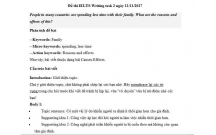
IELTS Writing task 2 - chủ đề Family
5
3.250
837
Luyện thi IELTS
5
(New)
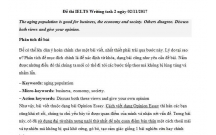
IELTS Writing task 2 - chủ đề chủ đề Population
5
2.829
838
Luyện thi IELTS
5
(New)
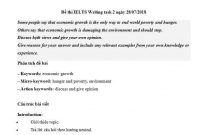
IELTS Writing task 2 - chủ đề chủ đề economic
4
4.249
768
Luyện thi IELTS
4
(New)
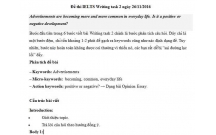
IELTS Writing task 2 - chủ đề chủ đề Advertisements
5
3.558
851
Luyện thi IELTS
5
(New)
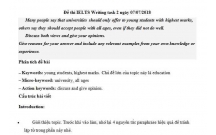
IELTS Writing task 2 - chủ đề chủ đề University
5
4.376
862
Luyện thi IELTS
5
(New)
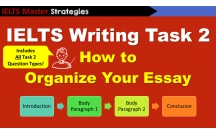
Đề thi IELTS Writing task 2 ngày 28/07/2018
3
1.907
479
Luyện thi IELTS
3
(New)

Tiêu chí chấm thi IELTS Writing task 1
5
3.352
571
Luyện thi IELTS
5
(New)
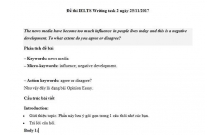
IELTS Writing task 2 - chủ đề news media
5
4.437
796
Luyện thi IELTS
5
(New)
thông tin tài liệu
Cambridge 11 - hướng dẫn làm bài IELTS Writing task 2
It is difficult to conceive a sustainable economic growth without a clean and healthy living condition for people. For this reason, many suggest a new legislation on household waste recycling as the only way to protect the living environment. I partly agree with this statement.
On the one hand, I concur that a law on waste recycling is a promising approach to the problems of waste from households. It is true that when a bill is adopted and made into a law, people undoubtedlypay more attention to it and take it with more serious consideration. If they know that they can be fined, punished or even imprisoned for not obeying recycling laws, they will certainly abide by the laws and take more responsibility for classifying the waste from their homes. This will gradually form a good habit of protecting the surrounding environment among the population. For this reason, more waste from home can be recycled, contributing to a cleaner environment.
Mở rộng để xem thêm
từ khóa liên quan
tài liệu mới trong mục này
tài liệu hot trong mục này
tài liệu giúp tôi
Nếu bạn không tìm thấy tài liệu mình cần có thể gửi yêu cầu ở đây để chúng tôi tìm giúp bạn!
xem nhiều trong tuần
SO SÁNH VĂN MIÊU TẢ VÀ VĂN TỰ SỰ
Sinh học 11 Pha sáng và Pha tối
ĐẶC ĐIỂM CƠ BẢN CỦA THỂ THƠ 4 CHỮ
BIỂU MẪU ĐỀ NGHỊ NHẬP KHẨU THUỐC CHƯA CÓ GIẤY ĐĂNG KÝ LƯU HÀNH THUỐC TẠI VIỆT NAM KHÔNG VÌ MỤC ĐÍCH THƯƠNG MẠI
ÔN TẬP KINH TẾ NÔNG NGHIỆP
ĐỀ CƯƠNG ÔN TẬP KINH TẾ QUỐC TẾ
yêu cầu tài liệu
Giúp bạn tìm tài liệu chưa có
×



